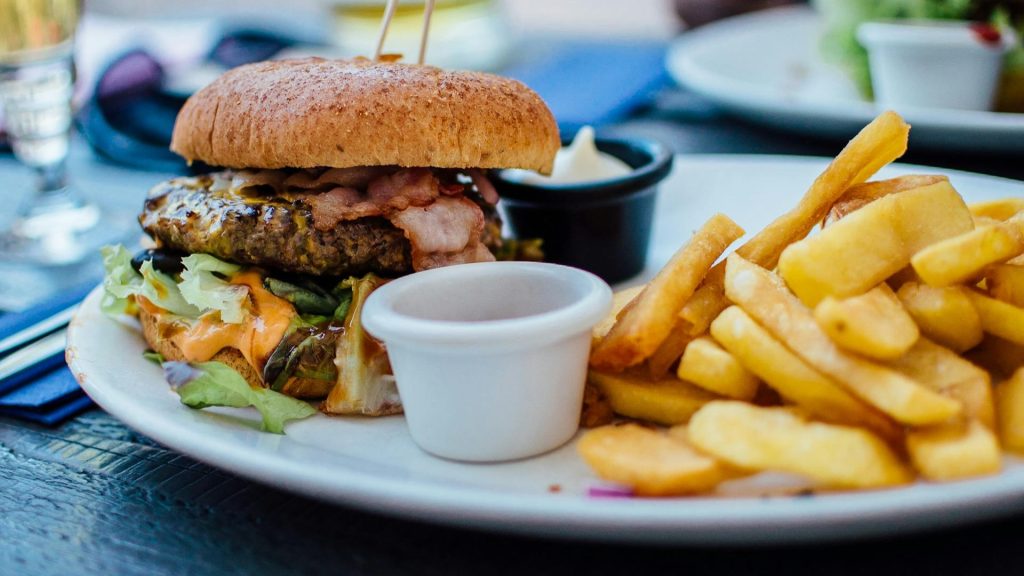FREE Shipping on Orders over $89 with Account – Create One Today!
- (844)-859-9400
- Get Help

If you have been diagnosed with diverticulitis, then the following scenario has likely occurred: You sit down to a nourishing meal only to look at your plate and hesitate. Every bite feels like stepping on a potential landmine. What if I told you there’s hope? You can know exactly what to avoid to keep those painful flare-ups at bay.
In our exploration of 7 foods to avoid with diverticulitis, we’ll venture into the murky waters of dietary dos and don’ts for managing this condition.
You’ll learn how some meals can be like wolves in sheep’s clothing – seeming innocent enough but potentially exacerbating your symptoms. We’ll dissect why dairy products might not be your best friend during an acute attack, or why that juicy steak could cause more harm than good.
Diverticulitis is a painful condition caused by inflammation of small pouches, known as diverticula, in the colon’s lining. An important factor contributing to this discomfort is diet, and medical experts emphasize that a diet low in fiber may increase your chances of developing diverticulitis.
Finding relief from symptoms means understanding which foods trigger flare-ups. Adjusting your diet can be an effective strategy for managing these painful bouts associated with diverticular disease.
The impact on quality of life makes it crucial for patients to consult their healthcare provider about suitable dietary changes designed specifically around individual needs and conditions.
There’s a reason why red meat makes the list of foods to avoid with diverticulitis. Studies show that excessive consumption of this protein source is linked to an increased risk of developing this painful condition.
This doesn’t mean you have to completely ditch your steak dinners, but moderation is key. Too much can lead to inflammation in your digestive system, which worsens diverticulitis symptoms.
According to the American College of Gastroenterology, high-fat foods like fast food or greasy takeout are no better either. They cause similar problems as red meat due to their unhealthy fat content, potentially causing flare-ups and discomfort.
Cutting back on both these food groups might not be easy if they’re staples in your diet, but trust us – it’ll make a difference.
If you’re dealing with diverticular disease, dairy products might not be your best friend. It turns out that these foods can worsen symptoms for those suffering from this condition.
You see, some people who have diverticulitis also struggle with lactose intolerance. Consuming milk and other dairy items can cause bloating, gas, and discomfort—symptoms nobody wants when they’re already dealing with a painful gut condition.
But there’s more. Dairy products often come packed full of fat which is another red flag for anyone looking to avoid inflammation in their digestive tract.
Before deciding to consume dairy, take a moment to consider whether the potential risk of inflammation is worth it.
People with diverticulitis should avoid fried foods for several key reasons. These foods are high in unhealthy fats, making them hard to digest and putting extra strain on an already inflamed digestive system. This can worsen diverticulitis symptoms.
Additionally, fried foods are low in dietary fiber, essential for healthy bowel movements and for reducing colon pressure. A lack of fiber can lead to constipation and increase symptoms. Furthermore, the fats in fried foods can increase inflammation, exacerbating the inflammation already present in diverticulitis.
The capsaicin in spicy foods, which gives them heat, can irritate the stomach and intestinal lining. This is a concern for diverticulitis patients who already suffer from inflammation and infection in the colon.
Eating spicy foods can worsen diverticulitis symptoms like abdominal pain, increase inflammation, and sometimes trigger or intensify diarrhea. This added strain on the colon is particularly harmful during flare-ups. Spicy foods also speed up bowel movements, which can further irritate a sensitive digestive tract, causing cramping and discomfort.
Therefore, people with diverticulitis are generally advised to avoid or limit spicy foods, especially during flare-ups.
Refined grains and sugars are commonly found in many processed foods and can be problematic for individuals with diverticulitis. These foods are known for their low fiber content and high glycemic index, which can affect digestive health.
Here are some examples and why they should be avoided, along with healthier substitutes:
It’s important to note that dietary needs can vary significantly among individuals with diverticulitis. Some may tolerate these foods without issue, while others might find them problematic. Consulting with a healthcare provider or dietitian for personalized dietary advice is always recommended.
Individuals with diverticulitis are often advised to follow a low FODMAP diet, as recommended by institutions like Johns Hopkins Medicine. The low FODMAP diet is designed to reduce the intake of certain carbohydrates that are poorly absorbed by the gut and can trigger symptoms in sensitive individuals.
In the context of diverticulitis, certain fruits and vegetables are known to aggravate the gut and should be avoided. These include:
It’s always recommended to consult with a healthcare provider or dietitian before making significant dietary changes, especially for conditions like diverticulitis.
When dealing with diverticulitis, it’s crucial to understand the impact of alcohol on your condition. Alcohol is known to cause gastric irritation, which can exacerbate the symptoms of diverticulitis. Moreover, regular consumption of alcohol may lead to an increased frequency of flare-ups, making the condition more challenging to manage.
Your healthcare provider is the best source of advice on how to handle diverticulitis symptoms. In many cases, they may recommend completely abstaining from alcohol to prevent any worsening of the condition.
For years, individuals with diverticulitis have been told to steer clear of certain foods. However, recent studies and research have debunked some of these food myths associated with the condition:
The truth about these misconceptions opens up more dietary options for those managing their symptoms through diet modification. Understanding what constitutes your personal ‘list of foods to avoid with diverticulitis’, however, should always involve consultation from healthcare professionals who understand your unique medical history and needs.
Mastering your diverticulitis diet isn’t a cakewalk, but it’s achievable. You’ve learned the importance of understanding this condition and how diet impacts it.
The takeaway? Red meat and high-fat foods can aggravate symptoms, so consider minimizing them in your meals. Dairy can be an issue, given its potential for lactose intolerance and fat content.
Fried and spicy foods are known triggers too, while those sneaky high-FODMAP ones might add unwanted pressure on your colon. Don’t forget about refined grains and sugars – they’re hidden culprits that could cause inflammation!
Remember: It’s not just about pinpointing the “7 foods to avoid with diverticulitis”, but building a healthier lifestyle overall.

Edited for content by ADAM PAGE.
